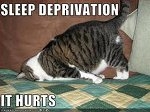NOTE WELL - This thread has been updated and retitled, but as the content was similar to the latest news, I decided not to start a new thread.
One of the sayings that I invented many years ago to help me keep in touch with reality was this one -
There is no point in a sick mind consulting a sick mind about a sick mind.
To bring it up to date I could just as easily say -
There is no point in a sleep deprived mind consulting a sleep deprived mind about a sleep deprived mind
So when I am sleep deprived it is not a good idea for me to ask myself if I am capable of, say driving, as the sleep deprivation can make me incapable of thinking rationally. So I can easily decide I am capable of driving when, in fact, I am not.
Now let us look at a debate going on in the medical profession, where our lives are the one's at risk.
From Medscape Medical News
Organized Medicine Bristles at Proposed 'Sleep Regulations'
by Robert Lowes
January 12, 2011 — Sleep deprivation can addle someone just as much as drinking a 6-pack of beer, and therefore regulations to protect patients from yawning surgeons are justified, asserts a recent perspective article in the New England Journal of Medicine (NEJM).
The authors suggest that surgeons who have been awake for 22 of the last 24 hours could be required by law to disclose their condition to patients scheduled for elective surgery, who could then decide whether to turn to a fresher physician or reschedule.
Physicians differ on the need for regulations around sleep deprivation.
Not so fast, replies organized medicine. Yes, fatigue can fuzz up thinking and degrade technical skills. However, mandating disclosure of sleep deprivation would usurp a physician's professional judgment as to whether he or she is fit to operate, and could give litigious patients one more reason to file a malpractice suit, physicians argue.
"It opens a whole can of worms," Jim Fasules, MD, senior vice president for advocacy at the American College of Cardiology, told Medscape Medical News.
The debate over a regulatory solution for the problem of sleep fatigue is not as theoretical as a recommendation in an editorial. The consumer advocacy group Public Citizen and 2 organizations representing medical students and residents have asked the US Occupational Safety and Health Administration (OSHA) to limit work shifts for all residents to 16 hours. Because residency training helps mold the culture of medicine, OSHA restrictions on work hours could reverberate throughout the profession, and not entirely for the good, some physicians contend. For one thing, they fear the growth of a shift mentality that subordinates patient care to physician comfort.
"This is a 365-day-a-year, 24/7 career choice, to become a neurosurgeon," said H. Hunt Batjer, MD, chair of neurological surgery at Northwestern University in Evanston, Illinois, and a former chair of the American Board of Neurological Surgery.
In their NEJM article, lead author Michael Nurok, MD, PhD, and coauthors concentrate on the common scenario of surgeons who have been up all night, only to face an elective surgery scheduled for the morning. The results are often not pretty. The authors cite research showing that the risk for complications rises 83% for patients who undergo an elective daytime operation performed by someone who had less than a 6-hour opportunity for sleep between procedures while they were on call the night before.
One simple way to safeguard patients, write the authors, is to avoid scheduling elective procedures for physicians the day after they have been on night call. Otherwise, sleep-deprived physicians should not be allowed to proceed with an elective procedure unless they first obtain the patient's informed consent with regard to the risks they face. The patient should then have the right to undergo the surgery with that physician, reschedule it, or choose another physician.
Mandatory Disclosure Called "Oppressive and Insidious"
Accompanying the article by Dr. Nurok and coauthors is a rebuttal by 3 leaders of the American College of Surgeons (ACS): executive director David Hoyt, MD; president L.D. Britt, MD, MPH; and Carlos Pellegrinni, MD, chair of the group's board of regents. They agree that sleep deprivation is a problem, but reject the idea of mandatory disclosure because it "eliminates the necessary judgmental latitude surgeons should possess to determine the fitness for providing optimal patient care." For example, a fatigued surgeon might decline to undertake a liver transplant but go ahead with a simpler operation such as a colostomy.
"Professionals of this caliber are likely to view the authors' recommendation that surgeons be required to disclose the number of hours they have slept as oppressive and insidious," write the ACS leaders, who wonder whether surgeons also will be asked to reveal marital or financial woes that might mar their operating room performance.
The solution they propose is training surgeons to recognize how fatigue degrades their cognitive and physical capabilities, and then decide whether to voluntarily disclose sleep deprivation to a patient or go another route.
However, the authors of the NEJM editorial point out a conundrum that runs counter to the ACS recommendation: Sleep deprivation degrades one's ability to recognize how the condition impairs judgment.
"Sleep-deprived clinicians are therefore not likely to assess accurately the risks posed when they perform procedures in such a state," they write. Hence, the need for mandatory disclosure.
"It Doesn't Require a Legislative Fiat"
In an interview with Medscape Medical News, Dr. Batjer said that in his career, coping with sleep deprivation has not been fraught with the problems raised in the NEJM article.
"If I'm up all night and I don't feel good about embarking on a procedure the next day, I talk to the patient about it," said Dr. Batjer. "I would never put someone in the operating room if I felt that I or someone else weren't good to go."
I would never put someone in the operating room if I felt that I or someone else weren't good to go.
And recharging his battery is not all that hard, he added.
"If I've been on call, and done a case, and I have a ruptured aneurysm to do in the morning, I lie down in my office for 15 minutes and come back fresh," Dr. Batjer said. "It doesn't require a legislative fiat."
Another opponent of sleep fiats is Michael Marks, MD, from Norwalk, Connecticut, a member of the Board of Councilors of the American Academy of Orthopaedic Surgeons.
"The biggest problem with legislation and regulations is their one-size-fits-all approach," Dr. Marks told Medscape Medical News. "Something that might work in an urban environment might not work in a rural environment, where there are fewer physicians.
"And 98% of physicians will do the right thing for their patients. [The NEJM editorial authors] are trying to create legislation to deal with the 2% who are outliers. That's not how things should be done in our society."
Petition Stresses Harm to Residents, Not Patients
Although there are no state or federal laws on the horizon to require disclosure of sleep deprivation, OSHA has been asked to address the issue of sleep deprivation among residents by more tightly restricting their hours.
Right now, residency programs operate under duty-hour requirements set by the Accreditation Council for Graduate Medical Education (ACGME). In 2003, the council limited resident work weeks to 80 hours and shifts to 24 hours. Beginning this July, a new ACGME rule kicks in, prohibiting first-year residents from working shifts longer than 16 hours and mandating a minimum of 8 hours off-duty afterward.
This change does not go far enough for Public Citizen, the American Medical Student Association, and the Committee of Interns and Residents, a union representing 13,000 residents. Last September, along with a number of individual physicians, including Charles Czeisler, MD, PhD, a coauthor of the NEJM editorial, they asked OSHA to impose a shift limit of 16 hours on all residents regardless of year. In addition, they requested a minimum of 10 hours off after a day shift, and 12 hours off after a night shift.
The petition does not stress the effect of sleep deprivation on patient care so much as its effect on the well-being of residents, who may work 30 hours straight. Exhausted physicians-in-training, it states, risk needle sticks, pregnancy complications, depression, and falling asleep while driving home.
"In order to fulfill OSHA's mission to 'send every worker home whole and healthy every day,' you must act now to address the dangers that extreme work hours pose for resident physicians," the petition states.
The coalition contends that schedule restrictions make sense because the federal government regulates the hours of other industries. The Federal Aviation Administration, for example, does not permit pilots to fly more than 34 hours per week, or 8 hours in a single day. In addition, other developed nations, such as members of the European Union, have instituted shifts that max out at 13 hours, with 11 hours off afterward.
Slaves to the Clock?
The petition asking OSHA to regulate resident duty hours has sparked uniform opposition from the American Medical Association, the American College of Physicians, and a coalition of 20 surgical societies, including the ACS.
For starters, organized medicine contends that the job of setting standards for residency training already belongs to the ACGME, and that OSHA would be a poor substitute because of its unfamiliarity with medical education and patient care. OSHA itself cited this reasoning when it rejected a similar request from Public Citizen in 2001 to regulate resident duty hours.
Physician groups also raise the issue of more patient hand-offs. Shorter shifts mean patients will be turned over more frequently from resident to resident, disrupting the continuity of care. The petitioners counter that studies of residency shift-shortening turn up evidence to the contrary — that patient care improves.
Another issue is inadequate training. The argument here is that rookie physicians need as much exposure as they can get to a myriad of medical conditions. "You could rob them of experience," said the American College of Cardiology's Dr. Fasules about shorter shifts. "Are we going to need to increase the length of residency programs? If so, where does that money come from?"
Are we going to need to increase the length of residency programs? If so, where does that money come from?
Dr. Marks of the American Academy of Orthopaedic Surgeons makes the same point: "It used to be said [in residency training] that when you were on call every other night, you missed half the cases," he said.
Long hours in and of themselves have training value, some would say, because they harden physicians for future rigors.
"Residents need to learn to prioritize and think on their feet," said Dr. Batjer. "If there is a terrorist attack, or a plane crash, with multiple casualties, physicians may have to be on their feet for more than 16 hours. They'll work as long as it takes to manage the situation."
Public Citizen and its fellow petitioners respond that lifelong learning combined with life balance is "at least as important as any experience to be gained between the 80th and 100th hour of a [residency] work week." They also discount the "toughen them up" rationale for long hours, saying physician work weeks after residency training are getting shorter, and on-call schedules lighter.
In yet another salvo against the Public Citizen petition, the 20 surgical societies told OSHA in a letter last month that current restrictions on resident hours are fostering a "shift mentality" and a "loss of professional responsibility to the patient." More restrictions, they warned, could further undermine patient care.
Dr. Fasules provides a hyperbolic, but apt, example.
"I'm in the middle of a 10-hour surgery," he said. "I look up at the clock and I say, 'I've reached my limit. I have to leave now.'
"You're a slave to the clock instead of the patient."
Proponents of stricter duty hours would reply, however, that if a physician is nodding off during surgery, the patient is ill served.
OSHA has yet to issue a decision on the residency hours petition, but David Michaels, PhD, MPH, assistant secretary of labor for OSHA, has already stated that he is "very concerned" about residents working extremely long hours, and that he is willing to hold training programs accountable.
"We know of evidence linking sleep deprivation with an increased risk of needle sticks, puncture wounds, lacerations, medical errors and motor vehicle accidents," Dr. Michaels said in a written statement last fall. "It is clear that long work hours can lead to tragic mistakes, endangering workers, patients and the public.
"Hospitals and medical training programs are not exempt from ensuring that their employees' health and safety are protected."
N Engl J Med. 2010;363:2672-2673, 2577-2579. Abstract Abstract
I think most of us would agree with -
However, the authors of the NEJM editorial point out a conundrum that runs counter to the ACS recommendation: Sleep deprivation degrades one's ability to recognize how the condition impairs judgment.
"Sleep-deprived clinicians are therefore not likely to assess accurately the risks posed when they perform procedures in such a state," they write.
You would think the above is pretty obvious, but evidently not. The arrogance of those who are against preventing sleep deprivation in Doctor's is staggering, and so unscientific as to make one wonder............................?
Mars














